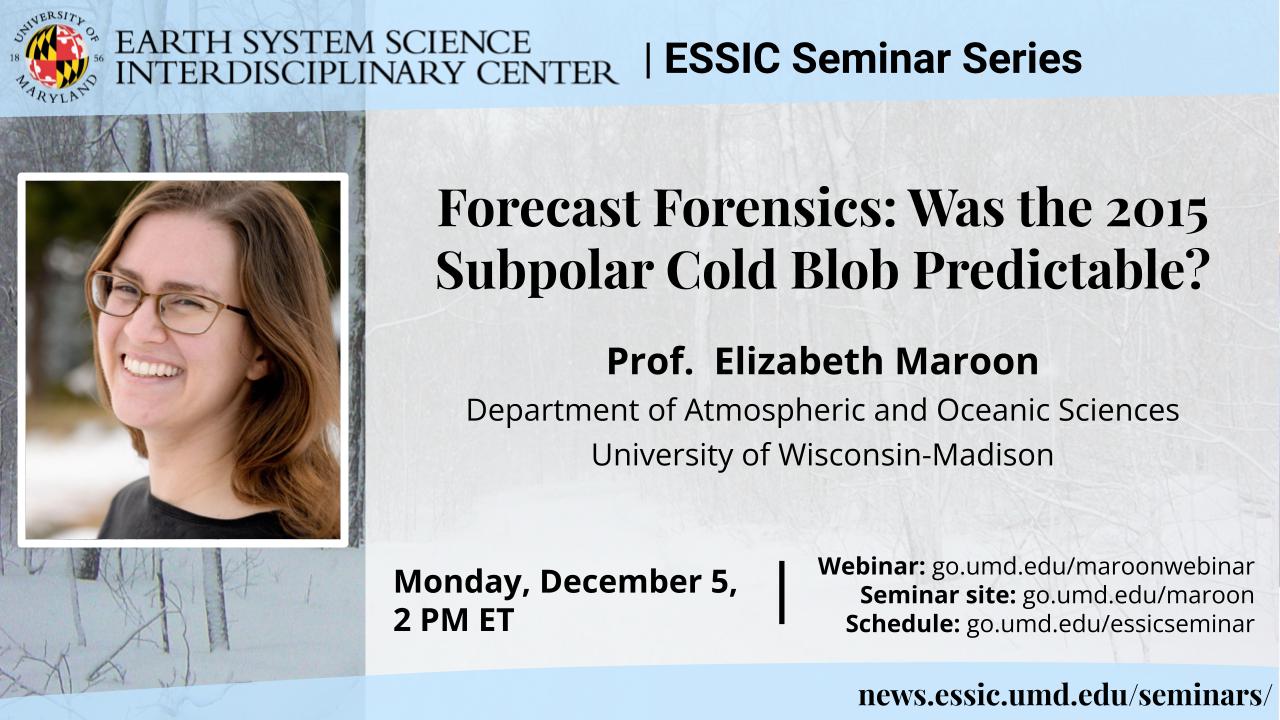
Forecast Forensics: Was the 2015 Subpolar Cold Blob Predictable?
Prof. Elizabeth Maroon
Department of Atmospheric and Oceanic Sciences
University of Wisconsin-Madison
Monday December 5, 2022, 2 PM ET
Abstract:
Having the ability to reliably predict extreme SST events with actionable lead time would be extremely useful. Such large magnitude events can harm ecosystems (e.g., marine heatwaves) and affect climate elsewhere through teleconnections. The near-record 2015 subpolar North Atlantic (SPNA) cold blob was one such event: it contributed to heat waves in Europe that summer. Despite otherwise high skill in subpolar North Atlantic SST, the Community Earth System Model version 1 Decadal Prediction Large Ensemble (CESM1-DPLE) failed to sustain its predictions of this subpolar cold blob, despite the SPNA being initialized from already cold conditions. Here, we examine what happened in this extreme event’s predictions in the CESM1-DPLE, also using a suite of other CESM simulations and sensitivity experiments. Most experiment modifications lead to an even further degraded forecast, an indication of this event’s potential un-predictability. We also investigate this event in a suite of other prediction systems, finding a similar struggle to sustain the predicted intensity and spatial extent of the observed 2015 cold blob. Although improving the initialization of upper ocean conditions might improve the ensemble range of forecasts during this event, the large role of atmospheric forcing in the event’s evolution likely prevented the prediction of the 2015 SPNA cold blob more than a couple of months in advance. Despite this particular event’s challenges, this kind of forensic approach to climate prediction analysis is useful for building process-level understanding and suggesting avenues for prediction system development.
Biosketch:
Elizabeth Maroon is an Assistant Professor in the Department of Atmospheric and Oceanic Sciences at the University of Wisconsin-Madison, where she started building a new research group in early 2020. Her research focuses on how the oceans and climate interact in the past, present, and future and how we can apply fundamental understanding of ocean-climate processes to improve climate model predictions and projections. Current focuses in her group include subpolar North Atlantic Ocean mechanisms and model biases; the predictability of marine heatwaves and marine cold spells on seasonal and longer timescales; and building climate model diagnostic software for both research purposes and the classroom. She received her PhD in Atmospheric Sciences from the University of Washington in 2016 and a Bachelors of Science in Physics and Earth, Atmospheric and Planetary Sciences from MIT in 2010.
Webinar:
Event site: https://go.umd.edu/maroon
Zoom Webinar: https://go.umd.edu/maroonwebinar
Zoom Meeting ID: 927 2916 2310
Zoom password: essic
US Toll: +13017158592
Global call-in numbers: https://umd.zoom.us/u/aMElEpvNu
For IT assistance:
Cazzy Medley: cazzy@umd.edu
Resources:
Seminar schedule & archive: https://go.umd.edu/essicseminar
Seminar Google calendar: https://go.umd.edu/essicseminarcalendar
Seminar recordings on Youtube: https://www.youtube.com/user/ESSICUMD

